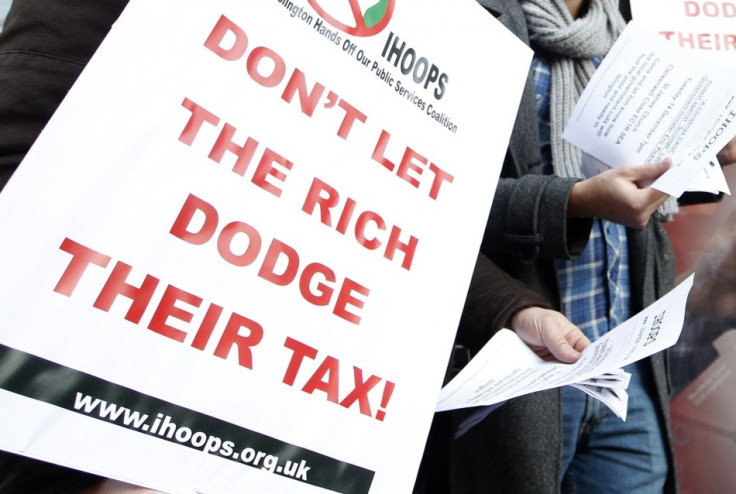Tax Avoidance: G20 and OECD 'Duck Big Issue'

One of Britain's leading campaigners for tax reform welcomed the G20's commitment to cracking down on avoidance, but warned that it still "ducks the big issue" and falls short of what is needed.
Finance ministers from the G20 countries have backed the Organisation for Economic Cooperation and Development's (OECD's) proposals on tax, including forcing multinationals to give all tax authorities a country-by-country breakdown of how much they pay to respective treasuries on earnings.
"It's an indication of the change in the mood and that has to be significant because without a change in mood, without a change in the underlying political world, then clearly you'd never get international tax reform. This is obviously important in that sense," Tax Research UK's Richard Murphy told IBTimes UK.
"Let's not understate the significance of them thinking that international tax abuse is an issue of political significance right at the top of the summit agenda."
Murphy, who is a chartered accountant and economist, continued: "It does not represent the significant change that is required to tackle the scale of the problem that they have identified.
"They've said that the problem is enormous, they say it threatens the credibility of the international taxation system, they say it could even threaten the balance of trade and competition, and the way in which economies are organised.
"All they've said they'll do is take a flawed system and try to make it better. Well you can try and modify a flawed system as much as you like, but if it's got a fundamental design fault in it you never come up with a perfect system or anything even close to it."
He said what needs to be looked at - but has not - is the way companies operating under a parent are treated as separate entities. Instead, said Murphy, the group's umbrella company should be taxed as a whole and have the revenues generated from that taxation allocated to specific countries.
"That is entirely possible, even within some aspects of the existing OECD framework," he said.
Murphy added that the US Government is hostile to significant tax changes because they would hit many tech giants, such as Google, which are based in America. He also said big business has been consulted heavily on tax reforms and they are in favour of maintaining the current system that often lets them easily avoid national tax authorities.
The OECD in its report said multinationals "abused" tax systems across the world and that current international law, devised in the 1920s, desperately needed updating.
"National tax laws have not kept pace with the globalisation of corporations and the digital economy, leaving gaps that can be exploited by multinational corporations to artificially reduce their taxes," the OECD said while announcing the new tax plan.
HMRC's 'unhealthily cosy' relationship
The UK parliament attacked Britain's tax office HMRC over its incestuous relationship with tax avoidance accountancy giants and demanded that the "ridiculous conflict of interest" be banned.
A report from the Public Accounts Committee (PAC) heavily criticised the HMRC over its inability to tackle corporate tax dodgers and the big accountancy firms that help big businesses pay as little tax as legally possible, through loopholes in the law.
PAC MPs called for clarity in and simplification of "hopelessly complex and outdated" tax law.
They also told the government to give HMRC the resources it desperately needs to clamp down on tax avoidance in Britain, which costs the Treasury £5bn in lost revenue.
"The large accountancy firms are in a powerful position in the tax world and have an unhealthily cosy relationship with government," said Margaret Hodge MP, chairwoman of the PAC.
"They second staff to the Treasury to advise on formulating tax legislation. When those staff return to their firms, they have very inside knowledge and insights to be able to identify loopholes in the new legislation and advise their clients on how to take advantage of them. The poacher, turned gamekeeper for a time, returns to poaching.
"This is a ridiculous conflict of interest which should be banned in a code of conduct for tax advisers, as we have recommended to the Treasury and HMRC."
Google, Amazon and Starbucks
Three names to hit British headlines over corporate tax avoidance are internet search behemoth Google, online retail giant Amazon, and ubiquitous US coffee chain Starbucks.
Starbucks paid just £8.6m in taxes on £3bn sales in the UK since 1998, and paid no corporation tax in the country in the three years to 2012.
After public outcry and negotiations with HMRC, Starbucks agreed to hand over £20m in corporation tax. Bosses claimed the firm made no profit in the UK, but MPs accused Starbucks of exporting earnings abroad to avoid paying tax.
Google only paid £3.4m in UK taxes in 2011, despite reporting £2.5bn in UK sales and a group-wide profit margin of 33%.
Matt Brittin, Google vice president, was hauled in front of the PAC to be grilled over the tech firm's alleged tax avoidance. Google maintained that it did not pay much tax in the UK because barely any sales were generated there, but MPs had heard from former employees who disputed that.
"Literally 99% of the companies paying for advertising with Google do not have contact with the UK," Brittin told MPs.
"No money changes hands in the UK. Firstly, the rights to what we sell and are sold are owned by Google in Ireland, under intellectual property rights.
"We are talking about buying advertising on a platform created in the US. In the UK, we cannot sell what we don't own, we cannot agree a price, we cannot agree on volume discount and we can't close a deal from Britain."
Amazon's main UK unit paid less than £1m in income tax in 2011, while its UK sales totalled between £3.33bn and £4.53bn.
© Copyright IBTimes 2025. All rights reserved.






















